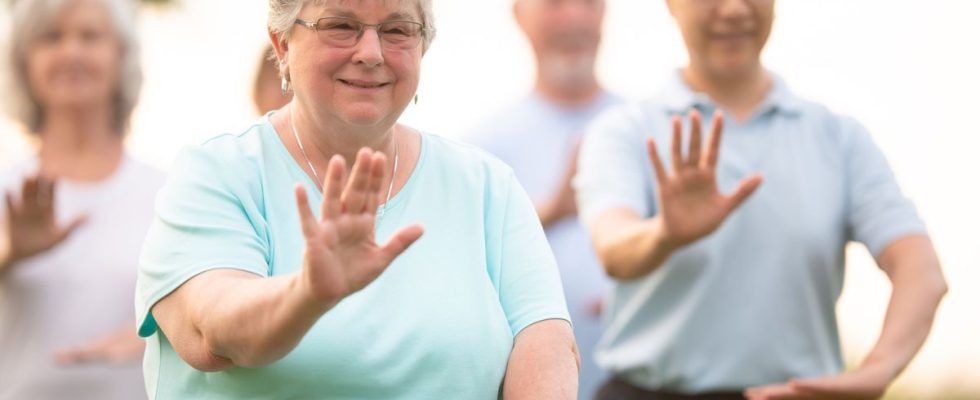Published on
Updated
Reading 3 min.
A traditional martial art of Chinese origin, tai chi proves to be a physical practice beneficial to health, particularly for the elderly. Several studies have recently highlighted its many virtues, whether to combat certain cognitive disorders or alleviate the symptoms of Parkinson’s disease.
Like many sports, martial arts can significantly help keep fit, combat a sedentary lifestyle, and improve concentration and mental well-being, but some of these disciplines are more beneficial for health than others. . This is the case of tai chi which, according to the French Federation of Chinese Energy and Martial Arts (FFAEMC), is “a Chinese internal martial art composed of circular and fluid movements, linked slowly and precisely, [qui] is practiced with bare hands or with weapons”. Two scientific studies have recently praised the merits of the discipline for people suffering from mild cognitive disorders or suffering from Parkinson’s disease. Enough to encourage its practice within the entire population.
Improve cognitive functions
Researchers at the Oregon Research Institute looked at the effects of tai chi on people with mild cognitive impairment or reported memory problems. More than 300 older adults affected by such disorders were randomly assigned to three groups: a first invited to practice classical tai chi sessions, a second to so-called “cognitively enhanced” tai chi sessions, and a third stretches. All to be done for one hour, twice a week, for 24 weeks, by videoconference. This work, published in the journal Annals of Internal Medicine, showed that cognitively enriched tai chi was more effective than the other two practices in improving cognitive functions and reducing the risk of dementia in the long term. The authors also noted improvements in memory, with benefits maintained at 48 weeks.
Alleviating the symptoms of Parkinson’s disease
Tai chi could also prove effective in curbing the symptoms and complications of Parkinson’s disease, a chronic neurodegenerative condition that is currently incurable. A team of Chinese researchers followed two groups of patients suffering from the disease – a first invited to do one-hour sessions of tai chi twice a week, a second constituting the control group – for more than five years, between January 2016 and June 2021. Presented in the Journal of Neurology Neurosurgery & Psychiatrythis research showed significant improvements in the “tai chi” group on several levels: slower progression of the disease, lower doses of medication, slower deterioration of cognitive function and other symptoms, such as sleep or quality of life, and a lower prevalence of complications related to the condition.
Fight against cognitive decline
A study published last April in JAMA Network Open showed that tai chi was more effective than brisk walking in improving cognitive functions in elderly people with type 2 diabetes and mild cognitive impairment. This work was led by researchers from the Fujian University of Traditional Chinese Medicine, and carried out among 328 adults aged 60 and over with type 2 diabetes and mild cognitive impairment. At 36 weeks, the authors of this research observed “a significantly greater benefit on cognitive function” from tai chi compared to brisk walking. While the researchers emphasize that more in-depth work is needed to confirm these results on a larger sample, they note that interventions including discipline could promote better physical and cognitive health.
